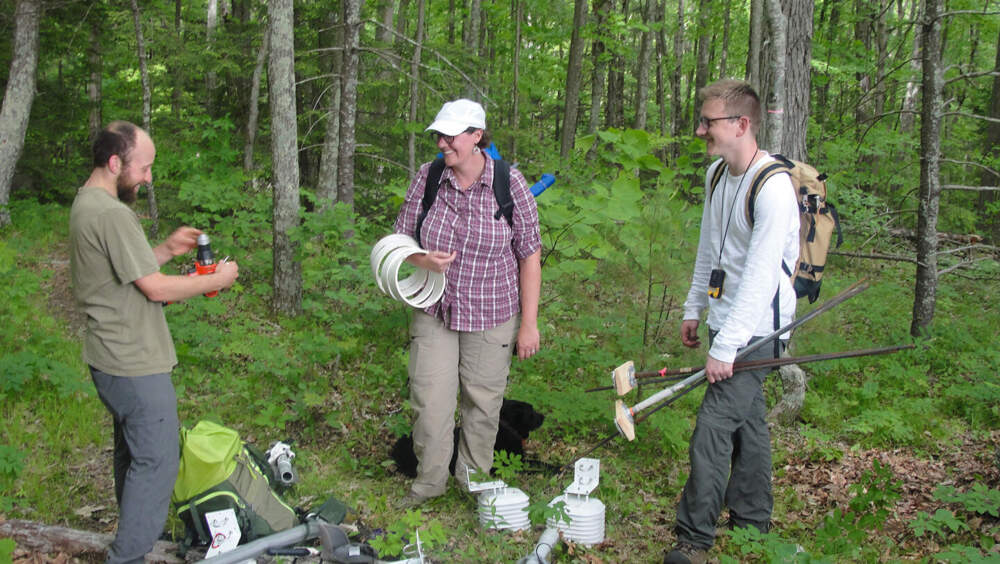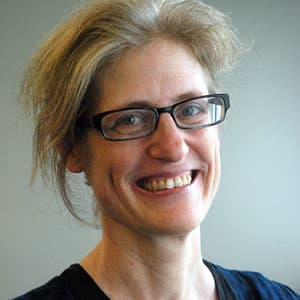Advertisement
BU professor who studies urban trees and carbon dioxide wins 'genius grant'
Resume
Boston University environmental ecology professor Lucy Hutyra spends a lot of her time studying trees.
She began her career working in tropical rainforests in Brazil, then switched to studying urban trees in Boston — specifically, how trees in the city interact with the carbon that's emitted from vehicles and buildings.
Hutyra's work has led her to be named a MacArthur Fellow. She's one of 20 winners of a so-called "genius grant" from the John D. and Catherine T. MacArthur Foundation, announced this week. She spoke about the achievement with WBUR's Sharon Brody on All Things Considered.
Interview Highlights
On being notified of the grant six weeks ago, when she was allowed to tell one person:
"I told my husband, who had never heard [the MacArthur fellowship]. And I was hyperventilating a bit. And he's like, 'Are you OK? What is going on?' And then he got on Google and he found out, 'Whoa, this is a really big deal.' So we've been talking about it over the weeks, and we did not tell my son. And he's a quite clever 11-year-old, and he figured it out, because the word 'genius' was used more often than normal in our household. And I apparently have a junior one."
On helping cities through her research:
"Cities for the last decade, two decades, have been at the forefront of climate action. And Boston is actually one of the world's leaders in this front, of aggressively trying to reduce greenhouse gas emissions. And when I got to Boston for my faculty position, one of the first questions we started looking at and thinking about is, 'How do we figure out if we're actually meeting this goal? How do we measure progress?'
"And so we set up a network of sites across the city [and] outside the city, measuring carbon dioxide in the air. And then we realized we needed more detailed information about emissions and combustion, and where [it was coming from] and when, and from what source.
"And it got to be pretty clear that vegetation in cities really mattered. And the trees in the city were actually about twice as productive as their country cousins. So tree for tree, these urban trees are doing a lot to influence how much CO2 we have in the air."
On how and why urban trees are more "productive":
"The rates of carbon uptake — the rates of photosynthesis — are higher. The trees are growing faster ... than what the textbooks say that they should, than what we measure in intact, undisturbed forests ecologists have traditionally studied.
"And the reason for that is ... a tree growing in the city is not competing with other trees for light. ... There's a lot of water, either because humans irrigate them with a sprinkler system, or the trees can also tap sewer lines and water lines — my plumber can attest to this. And there's extra nitrogen coming down in the rainwater that acts as a fertilizer."
On what her research findings mean in terms of the need for cities and developers to preserve and plant trees:
"I think that we should have lots of trees in cities. But there's a lot more nuance to that statement. We really need to think about where is there space for trees to actually grow and thrive. Are we going to invest the maintenance budgets to keep these trees alive? ... We should also think about the goals that we're trying to achieve. If we're trying to cool the city, trees are a great way to do it. But they're not the only way to do it."
On why she has studied relatively simple steps that can be taken to cool cities, including painting roofs white:
"Because we can't wait. The climate crisis isn't in a year, in 10 years, in 50 years. It's now. We've been living through it. Planting a tree today is fantastic, and in 10, 20, 50, 100 years, we'll be reaping the benefits of that. But the impacts of changing roof surfaces are felt the day the roof surface is changed. So this is not a substitute for planting trees. We should be doing both."
On what she might do with the $800,000, no-strings-attached MacArthur grant:
"I wish I had this idea in my pocket, but I don't. What I do have is an incredible security blanket for the next time that the National Science Foundation or NASA doesn't fund my brilliant idea that maybe needs a little more work. There's a way that I could do it anyway and start some of the pilot efforts. It's an amazing backstop to pursue some higher-risk ideas."
This segment aired on October 6, 2023.

